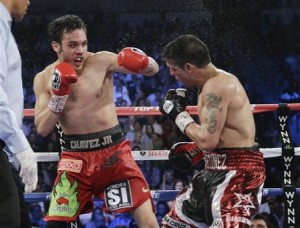
Julio Cesar Chavez Jr., left, exchanges punches with Sergio Martinez during the WBC middleweight title fight, Saturday, Sept. 15, 2012, in Las Vegas. Martinez won by unanimous decision. (AP Photo/Julie Jacobson)
LAS VEGAS — Mexican boxer Julio Cesar Chavez Jr. was suspended for nine months and fined $900,000 by the Nevada State Athletic Commission on Thursday for a failed drug test last year.
The popular, 27-year-old fighter, who’s the son of a famous boxer by the same name, tested positive for marijuana in September after his first professional loss. Chavez (46-1-1) was suspended from the date of the fight and was fined 30 percent of his $3 million purse for the bout against Sergio Martinez.
Chavez, who spoke by phone from Mexico, said through a translator that he was sorry for his actions and had taken the drug to curb his stress eight or nine days before the much-anticipated fight.
“I know I committed a big error. It was a mistake,” Chavez told the five commissioners. “I let a lot of people down.”
The commission could have banned him for one year and penalized him for up to 100 percent of his purse.
However, his lawyer, Donald Campbell, asked for leniency, arguing that the marijuana wasn’t a performance enhancing drug. He also said Chavez deserved credit for acknowledging that he used the drug.
“I’d like to fight as soon as I can,” Chavez said. “But I’m willing to accept anything you guys have because, like I said, I made a mistake, and I’m willing to take the punishment.”
Chavez’s failed test was revealed shortly after his dramatic loss to Martinez Sept. 15 in front of a sellout crowd of 19,000. Chavez already was fined $20,000 and suspended indefinitely by the WBC, whose belt he lost to Martinez.
In 2009, Chavez tested positive for another banned substance after his fight with Troy Rowland in Las Vegas. He received a seven-month suspension from the Nevada commission.
Chavez was arrested on drunken driving charges last year in Los Angeles, and struggled to make weight for a championship bout last February against Marco Antonio Rubio in San Antonio, Texas.
Commissioners were split on the punishment, voting 3-2 in favor of it. Commissioner Skip Avansino suggested a fine of 10 to 15 percent of the purse, saying Chavez appeared contrite about the violation.
But others, including Commissioner Pat Lundvall, contended the punishment should be closer to the 30 to 40 percent figure other fighters have faced for second-time infractions. She argued the commission should take a strong stance on marijuana, even if criminal penalties for the substance are light.
“While there can be great debate as far as in the public as far as the benefits and adverse impacts of … marijuana in general, that’s not up for debate in this commission,” Lundvall said.
After the hearing, Campbell called the punishment “excessive” and said he would talk with his client about possibly challenging it.